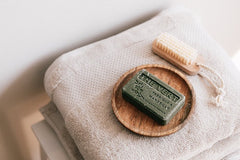SUSTAINABLE LIVING - HOTEL SOAP

What happens to leftover hand soap in hotels?
I've gone a little off-piste with my blogging this week! It may not be about sustainable sewing as such but it is about how businesses can make themselves more sustainable, and I found this particular question one I ask every time I stay at a hotel! The results are amazing, so here I am to share what I've found! (I came across a wonderful article from The Hustle which answered all my questions about what happens to waste soap from hotels.)
Almost all hotel bathroom sinks have a small bar of packaged hand soap for their guests to use. It may be just a tiny bar but still, I can safely say, they are very rarely fully used in the duration of a stay. And very few people will think to take the leftover piece of soap home with them. So what happens to all these little pieces? Think about the number of hotels there are across your town or city or country, then think about how many rooms there are within these hotels... that's a lot of leftover pieces of soap!
In 2008, a man named Shawn Seipler from Orlando USA, travelled often for business, staying at hotels. The question of what happens to leftover hand soap was asked to the front desk, at which the response was that it goes to landfill. This answer stuck with Shawn Seipler and he decided something must be done.
A few weeks later, he went to a Holiday Inn to ask if he could have their unused soap, to which the manager happily obliged. Shawn went on to 6 other hotels that same day and they all complied! Shawn gathered his friends to help out, and in a garage, they started using potato peelers to scrap off the outside of the soap bars. The bars were then put through a meat grinder, then melted in slow cookers. The melted soap was poured into soap moulds, left to dry overnight, then cut up into new bars.
On realising there were millions of waste soaps in contrast to children in other countries under the age of 5 dying from hygiene-related illnesses every day, he decided to find a way to get those new bars to those children who need them. Studies show that regular hand-washing could cut those deaths in half.
The mission would be called "Clean The World". However, an initial grant application was rejected. It was then, an annuity model was created: hotels would pay a small fee per room per month ($0.50 to $1.00) to join this recycling program. In return the hotels would be able to dispose of their soaps and receive impact reports they can use to detail the social and environment impact of their donations to meet sustainability goals.
Clean The World is now a success with other huge hotel chains around the globe taking part. The production being more professional, and no longer out of a garage with a group of friends! The soaps are distributed with well-known humanitarian partners around the world where it's needed. Although, they are now the largest hotel soap recycler in the world, it is still estimated that many people still do not have access to hand-washing facilities with soap, yet there are still thousands of hotels that throw away their soap waste. Fortunately, there are also other organisations similar to Clean The World, repurposing soap waste.
Find out more about these brilliant organisations:
- Clean The World - http://cleantheworld.org
- Diversey - https://diversey.com/en
- Eco-Soap Bank - https://ecosoapbank.org
So next time you stay at a hotel, ask them what they do with their soap waste. If they reply with landfill, talk about one of the programmes above and see if they're interested in signing up.
Let's keep more things out of landfill, and save lives whilst doing so!
Isn't it incredible!
Source:
https://thehustle.co/the-surprising-afterlife-of-used-hotel-soap/
https://cleantheworld.org/about-us/about-us-overview/
https://diversey.com/en/sustainability/soap-for-hope
https://ecosoapbank.org/about/mission
Please note that A KIND CLOTH is in no way affiliated with any aforementioned brands or external links.
Image credits: Karolina Grabowska @ Pexels
